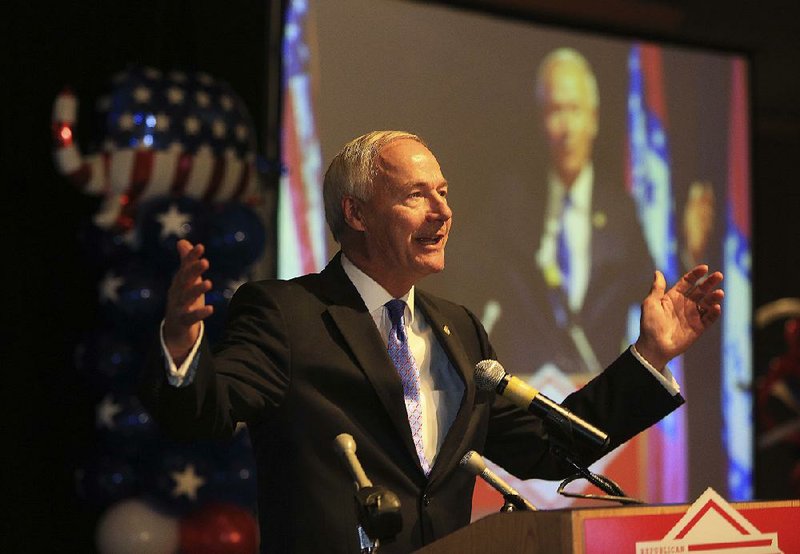Compared with traditional managed care, a plan to hire provider-led managed-care organizations to provide Medicaid benefits for the developmentally disabled and mentally ill would likely take longer to implement and would save less money, a consultant told lawmakers on Tuesday.
But John Stephen, managing partner of The Stephen Group of Manchester, N.H., told the Health Reform Legislative Task Force that either approach would help the state reach Gov. Asa Hutchinson's goal of curbing the growth of spending in the state's Medicaid program by enough to save $835 million over five years.
Sen. Jim Hendren, R-Sulphur Springs and a chairman of the task force, said after the meeting that he's open to any approach that can reduce spending without hurting the quality of care provided to Medicaid recipients or their access to health care providers.
"The main thing I'm interested in is that we don't just talk about it, but we actually do it," said Hendren, who is Hutchinson's nephew.
Limits on benefits and other planned changes to the state's Medicaid program are expected to save $771 million from July 1 of this year to June 30, 2021, Stephen said.
Once implemented, a provider-led managed-care model would save the Medicaid program an additional $40 million a year, while traditional managed care would save about $65 million a year, Stephen said.
Both approaches would also generate about $56 million a year in premium taxes that the state would collect from the companies or organizations offering the managed-care plans, he said.
Under managed care, the state would pay a company or organization a fixed amount per Medicaid recipient, per month, and the company or organization would be responsible for covering the recipients' health care expenses.
Hutchinson has supported that strategy as a way of reducing spending on the disabled and mentally ill but has met resistance from some health care providers and legislators, who fear the companies would cut recipients' benefits and payments to providers.
Last month, state Department of Human Services officials told task force members they are exploring a plan to implement managed care by entering into contracts with statewide, provider-led organizations.
By better coordinating care, a managed-care strategy would reduce the cost of so-called halo expenses, such as emergency room visits or routine medical care, provided to the mentally ill and developmentally disabled, Stephen said.
Based on results from other states, he estimated traditional managed care would reduce such expenses by about 8 percent after subtracting administrative fees paid to the managed-care companies, while the provider-led organizations would reduce halo expenses by about 5 percent.
He said a traditional managed-care strategy could be implemented as early as 2019, while a provider-led model would likely take until at least 2020 to become fully operational.
Sen. Missy Irvin, R-Mountain View, said she's been encouraged by discussions about provider-led managed care. She was among legislators who earlier this year crafted an alternative strategy to curb Medicaid spending without turning to managed care.
"I'm really hopeful that we can actually can find a good mix," between the provider-led managed care plan and the alternative plan supported by opponents of managed care, she said.
The Legislature formed the task force last year to recommend changes to the so-called private option and other parts of the state's Medicaid program that provides health coverage to more than 1 million low-income Arkansans.
In December the panel endorsed Hutchinson's goal to curb the growth of Medicaid spending by enough to save $835 million over five years.
Hutchinson set the goal as a way of assuring the state will have the money to pay for its share of the expanded Medicaid program that now covers more than 324,000 people.
Because the federal government typically pays for about 70 percent of the services provided under Arkansas' Medicaid program, reducing spending by $835 million over five years would reduce state spending by about $50 million a year.
That's roughly the projected net cost to the state of its expanded Medicaid program in 2020, when its share of the cost for the program will reach 10 percent.
A planned overhaul of the Medicaid program's mental health benefits, which would begin July 1 if approved by lawmakers, would save about $215 million through June 30, 2022, Stephen said.
Planned changes to services provided to the developmentally disabled are expected to save $135 million over the same period, he said.
Other cost-saving initiatives in the works include a plan by the nursing home industry that it says will save about $50 million a year, changes in drug benefits provided by the Medicaid program and a plan to hire managed care companies to provide dental benefits.
The task force is expected to issue its final report and recommendations by the end of next month.
Metro on 11/23/2016

